Mekari Insight
- Sales team collaboration software helps sales teams stay organized, manage leads effectively, and streamline workflows, ensuring every deal moves forward without unnecessary delays.
- The right software automates repetitive tasks, provides real-time analytics, and helps teams make informed decisions to improve efficiency and boost revenue.
- Sales teams work best when connected to finance, HR, and operations. Integrated sales management software ensures smooth coordination, reducing errors and improving overall business performance.
Managing a sales team isn’t just about tracking numbers—it’s about keeping everyone on the same page, streamlining workflows, and ensuring deals move forward without delays.
The right sales team collaboration software helps your team stay organized, collaborate effortlessly, and close more deals by integrating essential tools like CRM, automation, and analytics.
With so many options available, choosing the best one can be overwhelming. That’s why we’ve rounded up the top 13 sales management software to help you find the perfect fit for your team’s needs. Let’s dive in!
Sales management software for collaboration at a glance
Investing in sales team collaboration software isn’t just about making daily operations easier—it’s about building a stronger, more efficient sales team that consistently meets and exceeds targets.
| Software | Features | Target user | Pricing |
|---|---|---|---|
| Mekari Qontak | 360-degree database management, hierarchical access control, customized reports, and more | Wide range, from SMBs to large enterprises | Subscription details for Mekari Qontak |
| Pipedrive | Sales pipeline visualization, sales activity tracking, collaboration tools | Sales teams in small to medium businesses | Starts at $14/month per user |
| Salesforce | Team communication tools, customized dashboards, sales data analytics | Wide range, from SMBs to large enterprises | Starts at $24/month per user |
| Flock | Group messaging, video conferencing productivity tools | Teams needing easy communication & collaboration tools | Starts at $4.50/month per user |
| ClickUp | Task management, project planning, collaboration tools, time tracking | Teams & individuals who want flexible project management | Starts at $7/month per user |
| Hubspot CRM | Contact management, deal tracking, email marketing | Businesses focused on attracting and converting leads | Starts at $15/month per user |
| Wrike | Project planning, task management, Gantt charts | Teams with complex projects needing strong organization | Starts at $10/month per user |
1. Mekari Qontak
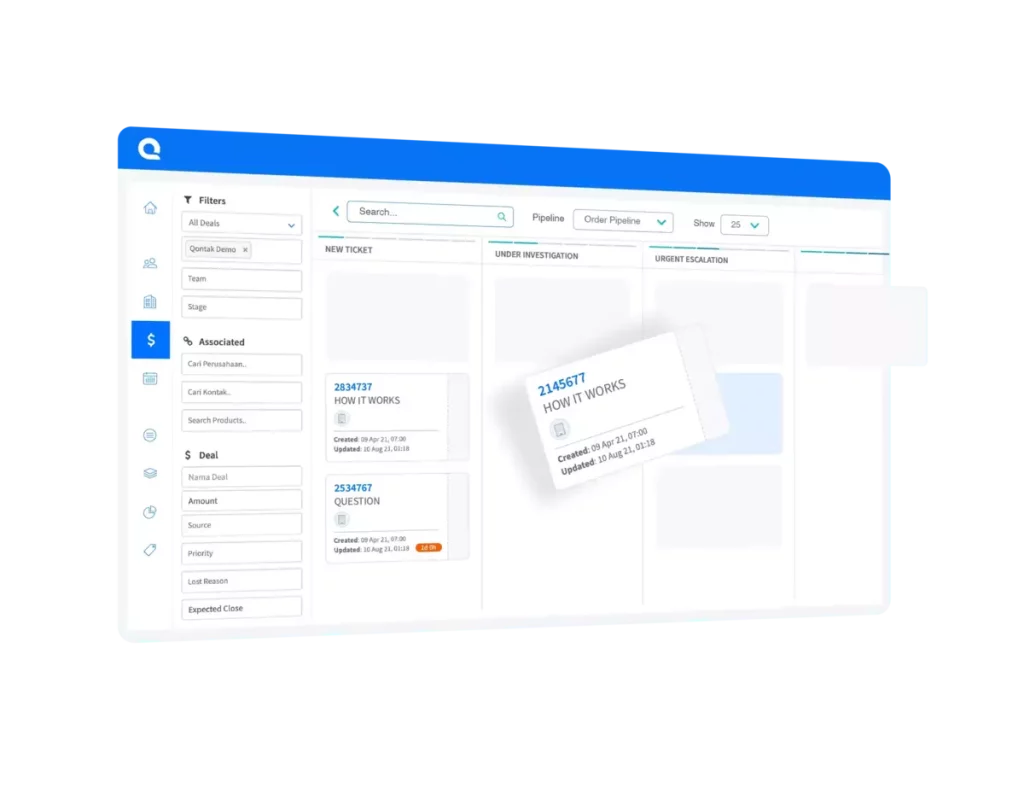
Mekari Qontak is an omnichannel CRM platform designed to help businesses enhance their sales processes efficiently.
Equipped with comprehensive features covering customer management and sales pipelines, this platform serves as a sales management system that streamlines business operations.
Key features of Mekari Qontak
- 360-degree database management, providing detailed and easily accessible customer insights.
- Hierarchical access control, ensuring data security by restricting access to authorized personnel.
- Automated activity logging, tracking interactions, communications, tasks, and files in a centralized system.
- Customizable sales and customer service reports, tailored to business needs.
- Trend analysis and business activity tracking, with detailed weekly and monthly reports.
- Real-time visualization of sales pipelines, tickets, and projects to monitor progress efficiently.
- Drag-and-drop functionality, advanced filters, and multiple pipelines for more flexible management.
- Customizable documents, easily formatted from Word or Spreadsheet.
Pricing: Subscription details for Mekari Qontak
Read more: Best SaaS CRM for Small Business on a Budget2. Pipedrive
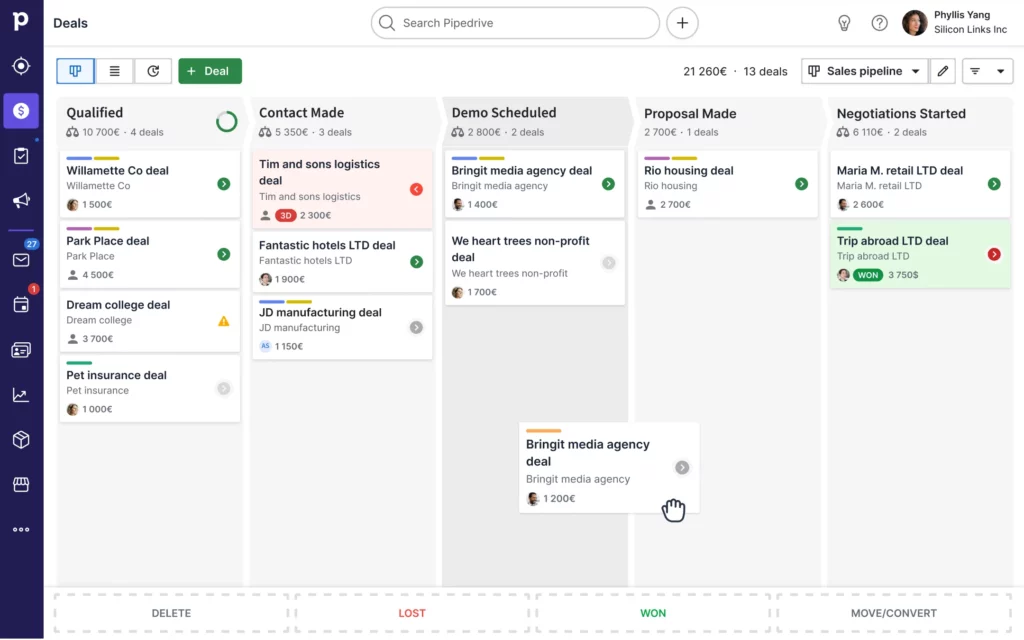
Pipedrive is a collaborative CRM platform that helps teams manage sales pipelines, track leads, and automate sales processes from start to finish.
Key features
- Clear sales pipeline visualization, with customizable stages and drag-and-drop functionality.
- Sales activity tracking, including calls, emails, and meetings, all in one dashboard.
- Communication and collaboration tools, enabling team members to leave comments on deal notes.
- Automation for repetitive tasks, such as follow-up emails and meeting scheduling.
Pricing: Starts at $14/month per user
3. Salesforce
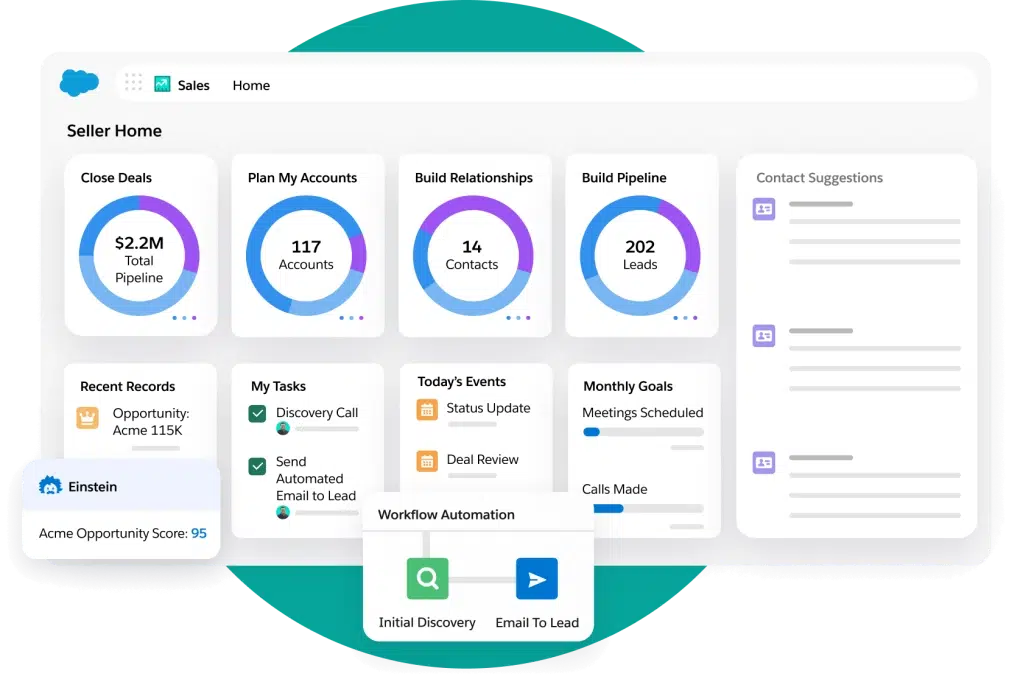
Salesforce offers a comprehensive suite of features, including sales team collaboration and marketing automation.
With its wide range of add-ons, Salesforce serves as an end-to-end solution for companies looking to streamline sales strategies and boost revenue.
Key features
- Seamless team communication, with Chatter for team messaging and real-time deal updates.
- Mobile-friendly access, allowing sales teams to stay connected anytime, anywhere.
- Highly customizable, with workflow settings and dashboards that adapt to business needs.
- Advanced sales data analytics, providing detailed reporting and powerful data visualization tools.
Pricing: Starts at $24/month per user
4. Flock
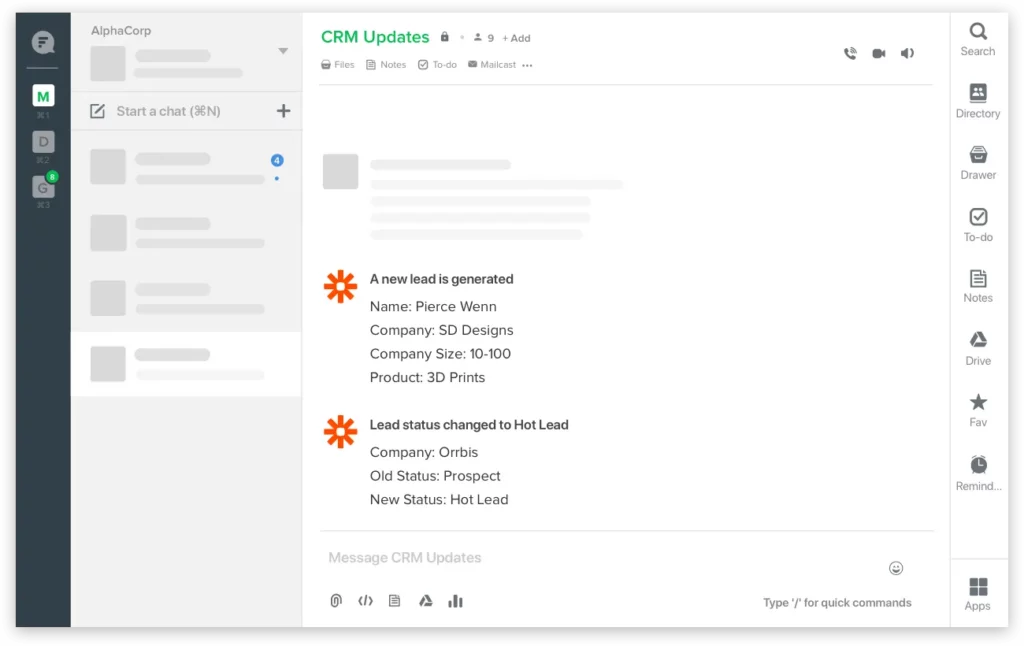
Flock combines team chat, video conferencing, and productivity tools in one platform, making communication more streamlined and boosting team productivity.
Key features
- Channel & group messaging, organizing team conversations efficiently.
- Built-in video conferencing, eliminating the need for additional apps.
- Integrated productivity tools, including to-do lists, polls, and automatic reminders.
- Secure file sharing, with encrypted document transfers for data protection.
- Flexible admin controls, making user management easier.
Pricing: Starts at $4.50/month per user
5. ClickUp
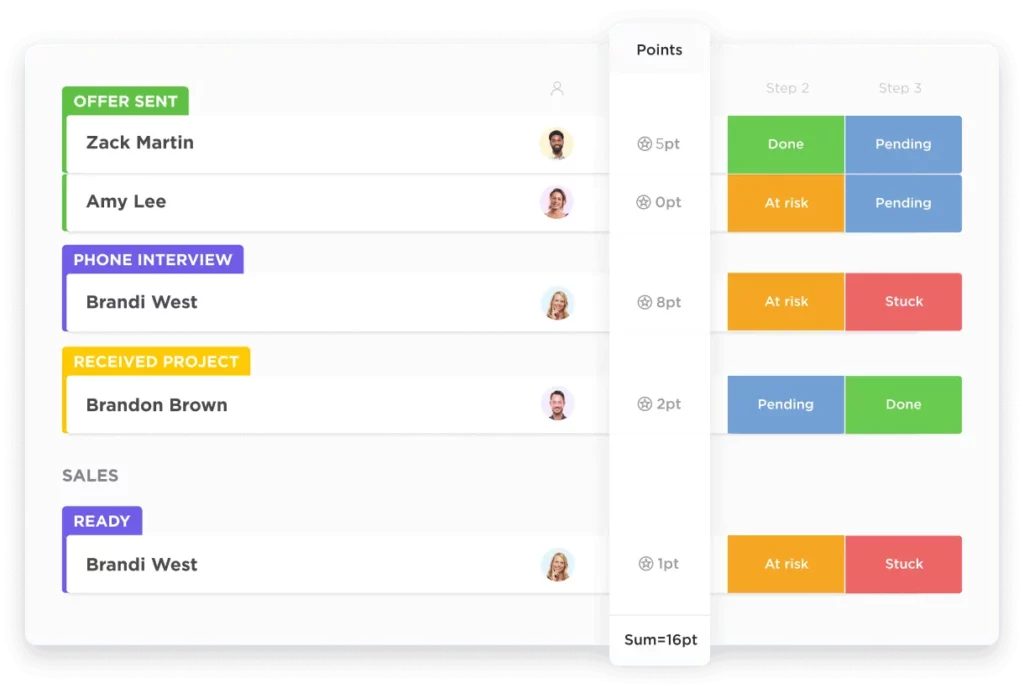
ClickUp is a work management software that centralizes tasks, documents, teams, and data into a single platform.
With its comprehensive features, ClickUp helps businesses streamline workflows, improve collaboration, and gain better project visibility.
Key features
- Task automation, reducing manual work with automated workflows.
- Forms & task templates, simplifying data collection and project management.
- Custom fields, allowing detailed task adjustments.
- Collaborative docs & whiteboards, enabling teams to work together in real-time.
- Video clips & comments, featuring screen recording and discussion threads.
Pricing: Starts at $7/month per user
Read more: 12 Strategies to Improve Team Collaboration & Communication6. HubSpot CRM
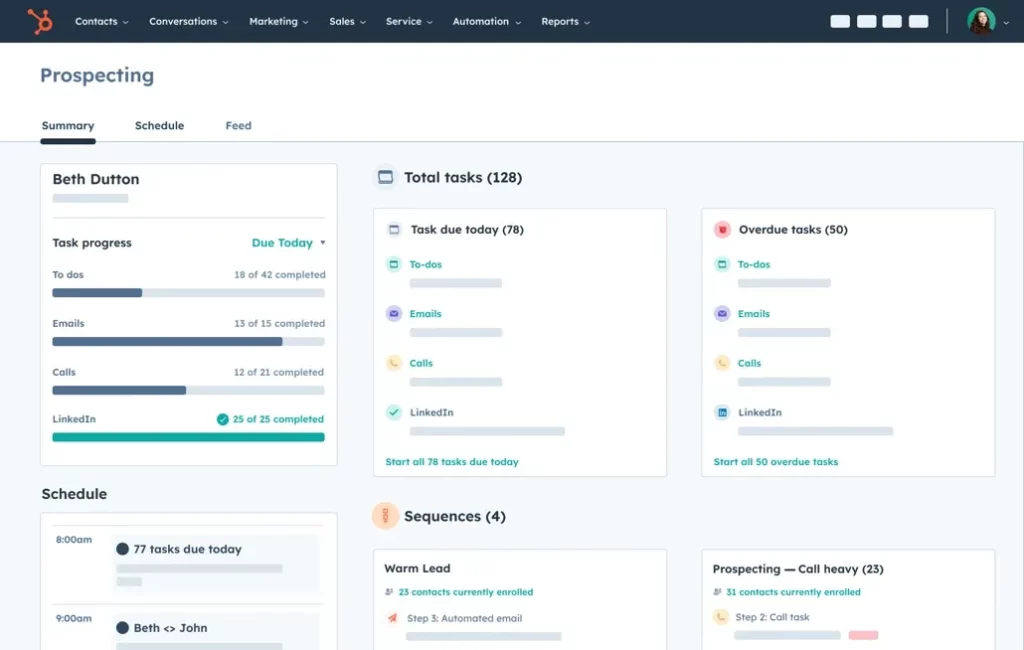
HubSpot CRM offers an all-in-one solution that integrates marketing, sales, and customer service into a single platform.
This makes it a standout choice among sales collaboration software, providing a seamless experience across various business functions.
Key features
- Contact management, enabling efficient customer data organization.
- Email tracking & sales automation, simplifying follow-ups.
- Live chat & customer service, improving real-time customer interactions.
- Dynamic lists & lead capture forms, making it easier to acquire new customers.
Pricing: Starts at $15/month per user
7. Wrike
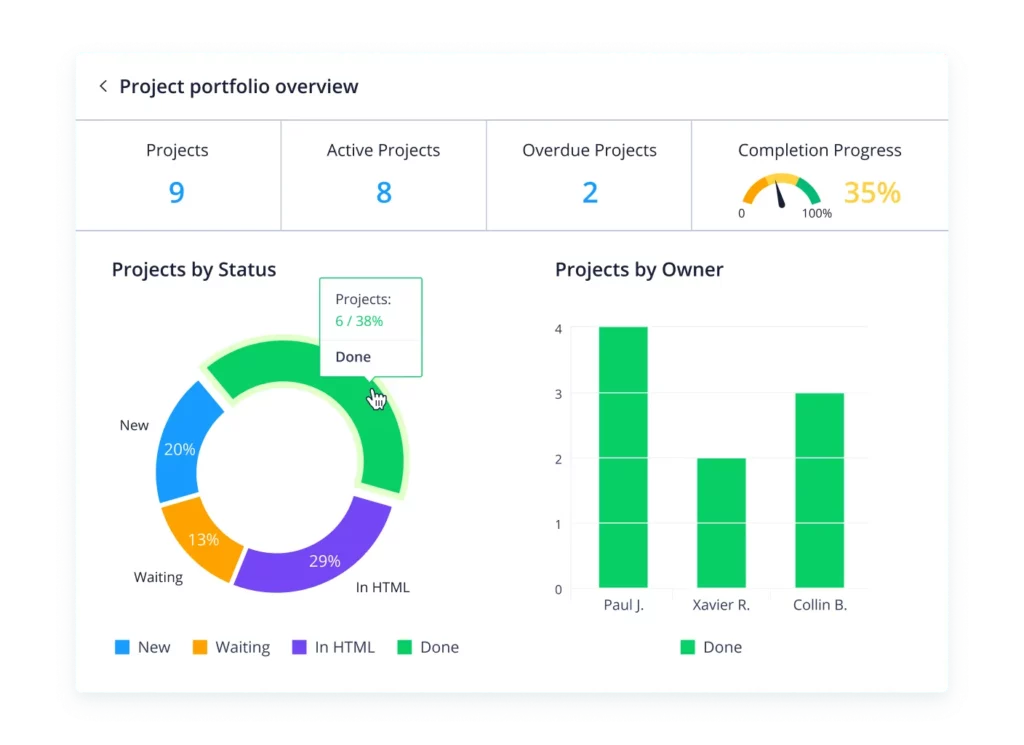
Wrike is a project management and sales collaboration tool with real-time collaboration features like live editing and dynamic request forms.
Additionally, integration with various tools and workflow automation makes it one of the most efficient project management solutions.
Key features
- Interactive Gantt charts, making project planning easier with clear visual timelines.
- Customizable dashboards, allowing tailored project tracking.
- AI-powered automation, reducing manual work and boosting efficiency.
- Resource management & workload balancing, ensuring optimal task allocation.
Pricing: Starts at $10/month per user
What is sales management?
Sales management software helps businesses track and manage their sales process more effectively. It gives managers a clear view of their sales pipeline, making it easier to monitor team activities, assess individual sales performance, and keep track of deals in progress.
With quick access to important data, managers can make smarter decisions and improve their sales strategies. This software combines essential tools like CRM, call and email automation, lead management, and sales reporting in one place.
By using an integrated sales team collaboration software, sales teams— from individual reps to sales directors— can work more efficiently, stay organized, and focus on closing deals.
Key considerations before choosing sales management software
Selecting the right sales team collaboration software is crucial for optimizing your team’s efficiency and boosting revenue.
With so many options available, it’s important to focus on key features that truly impact performance. Here are six essential factors to consider before making your decision:
1. User-friendly interface & seamless workflow management
Sales teams need a system that is intuitive and easy to navigate. The right platform should provide a clear sales pipeline view, task management, and real-time activity tracking.
A well-organized dashboard should instantly display what needs attention—emails, calls, or pending deals—so your team can focus on closing sales rather than administrative tasks.
2. Powerful lead & opportunity tracking
A strong lead management and pipeline tracking system ensures that no potential deal goes unnoticed. Your software should enable lead scoring, real-time tracking, and customizable pipeline views that align with your sales process.
This visibility helps sales teams prioritize their efforts and push deals forward efficiently.
3. Smart automation & productivity boosters
Repetitive tasks like email follow-ups, meeting reminders, and data entry can slow down sales teams. Look for software that automates these processes, freeing up time for sales reps to focus on engaging prospects and closing deals.
Features like email sequencing, automatic call logging, and AI-driven recommendations can significantly enhance productivity.
4. Advanced analytics & reporting for data-driven decisions
A good sales management system should provide real-time insights into sales performance, conversion rates, and pipeline health.
Customizable reports allow managers to track key performance indicators (KPIs) like response times, deal progress, and revenue forecasts, helping them make informed decisions to improve sales strategies.
5. Scalability & adaptability for business growth
Your sales management software should be able to grow with your business. Whether you’re a small startup or an expanding enterprise, the system should accommodate increasing sales volume, additional team members, and evolving sales processes.
The ability to customize workflows, adjust access permissions, and integrate new features ensures long-term usability and efficiency.
6. Integration with finance software for streamlined revenue management
Sales and finance teams work closely together, so having a sales management system that integrates with finance software is essential. Features like automated invoicing, real-time revenue tracking, and commission calculations ensure that sales and finance operations stay aligned.
Seamless integration with accounting platforms can help eliminate manual data entry, reducing errors and improving financial accuracy.
The essentials of sales management software
Here’s why investing in the right sales management software can transform your team’s productivity, effectiveness, and overall success.
1. Stay organized and never lose a lead
A disorganized sales process means lost opportunities. Keeping all leads, contacts, and sales activities in one place ensures that no valuable prospect falls through the cracks.
A great sales management tool allows reps to easily access client details, monitor follow-ups, and track interactions, so they always know the next step in their sales pipeline.
2. Track every prospect as they move through your sales funnel
From first contact to closed deal, every customer moves through a journey.
Sales management software gives you a complete view of your sales funnel, allowing you to track prospects, schedule timely follow-ups, and prioritize leads based on their likelihood to convert.
3. Monitor and support your sales team’s performance
A successful sales team needs both motivation and guidance. Sales management tools provide real-time insights into individual and team performance, helping managers track productivity, identify bottlenecks, and provide targeted coaching.
Features like leaderboards and live activity tracking also encourage friendly competition among reps.
4. Automate repetitive tasks and boost efficiency
Sales reps should spend their time selling—not drowning in admin work. With automation, follow-ups, emails, meeting reminders, and lead assignments can all be handled seamlessly.
This ensures timely responses and allows sales teams to focus on building relationships and closing deals.
5. Gain data-driven insights to improve sales strategy
Numbers don’t lie. Sales reporting and analytics provide valuable insights into performance trends, conversion rates, and revenue forecasts.
Managers can use this data to fine-tune sales strategies, identify areas for improvement, and make informed decisions that drive growth.
6. Strengthen communication and collaboration within your team
Sales isn’t a solo effort—it requires teamwork. A good sales management tool centralizes team communication, making it easy for reps to share notes, update deal statuses, and collaborate on key accounts.
With shared dashboards and messaging features, teams can work more effectively together.
7. Integrate with finance software for seamless revenue tracking
Sales and finance go hand in hand. A well-integrated system automatically syncs invoices, tracks revenue, and calculates commissions, keeping sales and finance teams aligned.
Tools like QuickBooks, Xero, or other accounting platforms help streamline financial processes and eliminate manual data entry errors.
8. Keep outreach consistent across email, calls, and messages
Engaging with prospects at the right time and in the right way is crucial. Sales management software integrates email, phone calls, SMS, and follow-ups into one platform, ensuring every interaction is logged and accessible.
This enables reps to personalize communication and build stronger relationships with potential customers.
9. Plan for growth with smarter forecasting and goal setting
Sales management isn’t just about tracking what has happened—it’s about predicting what will happen next.
Advanced tools forecast sales trends, track progress toward goals, and identify potential challenges, helping companies stay proactive rather than reactive.
The real sales management software for cross department collaboration
Sales management software is no longer just about tracking revenue—it’s about bridging departments, improving efficiency, and driving seamless collaboration across your organization.
The right solution doesn’t just support sales teams; it connects them with finance, HR, tax compliance, and operational workflows to ensure a smooth, automated, and integrated process from start to finish.
With Mekari’s suite of solutions, businesses can unlock a fully connected sales ecosystem:
1. Mekari Qontak
A powerful omnichannel CRM platform designed to streamline sales processes.
It offers a 360-degree view of customer data, allowing businesses to gain deep insights into their clients, while automating activity tracking and providing real-time visibility into sales pipelines and project statuses.
Its customizable reports and trend analysis ensure that marketing and sales teams are always on track.
2. Mekari Talenta
Helps manage field sales team attendance and calculate performance-based bonuses, ensuring that rewards are tied to effort and results.
3. Mekari Jurnal
A real-time financial management tool that integrates sales transactions directly into the company’s financial system.
This ensures seamless monitoring of sales performance and cash flow. Additionally, it synchronizes data across platforms, reducing manual input and the risk of errors.
4. Mekari Expense
Manages and streamlines reimbursements for sales-related expenses, such as travel costs or sales assets (e.g., brochures, banners), making it easy for teams to access funds when needed.
5. Mekari Sign
Accelerates the sales contract approval process with electronic signatures, eliminating the need for physical meetings and reducing delays in closing deals.
6. Mekari Klikpajak
Automates tax reporting by transferring sales data from Mekari Jurnal directly to Mekari Klikpajak, ensuring efficient tax compliance and making tax invoice creation and filing hassle-free.
7. Mekari Flex
Empowers sales teams by offering flexible benefits options and early salary access, which can boost employee motivation, satisfaction, and performance.
By adopting a unified sales team collaboration software, your team can work smarter, close deals faster, and eliminate inefficiencies that slow down progress.
Ready to transform your sales workflow? Explore how Mekari can empower your sales division today in this solution for sales division.
References
Close. ‘’9 Best Sales Management Software Tools for High-Performing Sales Teams’’
The Digital Project Manager. ‘’21 Best Sales Collaboration Software Reviewed in 2025’’




